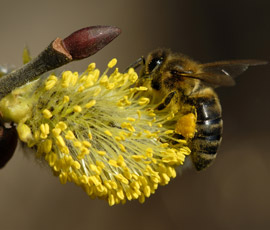Partial ban on neonicotinoids proposed by European Commission

The European Commission will propose a partial ban on key pesticides to protect bees, but it has ruled out a full ban.
The decision follows a report earlier this month by the European Food Safety Agency (EFSA), which concluded that three neonicotinoids, produced by Syngenta and Bayer CropScience, were harmful to bees.
EU health and consumer commissioner Tonio Borg said the commission will propose “ambitious but proportionate legislative measures”.
Speaking at a farm council meeting in Brussels on Monday (28 January), Mr Borg told EU agriculture ministers that a partial ban was necessary to protect bees, but a total ban was not justified.
“The health of our bees is of paramount importance. While this may be threatened by other factors, we must take decisive action wherever appropriate,” said the commissioner.
Mr Borg did not detail how restrictions will be enforced. However, he said they would be “ambitious but proportionate legislative measures” and called for harmony across EU member states to enforce them.
France, Italy, Germany and Slovenia have already implemented bans on some neonicotinoid uses, but so far, there have been none in the UK.
“The health of our bees is of paramount importance. While this may be threatened by other factors, we must take decisive action wherever appropriate.”
EU health and consumer commissioner, Tonio Borg
Bees are essential for food production as they pollinate many crops, especially fruits. A Friends of the Earth study found they are worth an estimated £510m a year to the UK economy.
But the report by EFSA, the EU food safety watchdog, concluded scientists had identified a number of risks posed by neonicotinoid pesticides to bee health.
Luke Gibbs, spokesman for Syngenta UK, said while the chemical company acknowledged Mr Borg’s comments to the EU farm council, EFSA’s conclusions were “highly theoretical and failed to take into account all relevant studies as well as independent monitoring”.
Syngenta also highlighted the omission by EFSA of key studies and field-monitoring data regarding its neonicotinoid pesticide Cruiser OSR (thiamethoxam) lent itself to a theoretical review detached from the reality of farming practices.
Bayer said bee populations were declining around the world for multiple reasons, including the parasitic varroa mite and associated viruses.
EFSA is due to publish a more comprehensive risk assessment for bees later this year, including a higher level of scrutiny for interpretation of field studies.
A separate report published earlier this month warned that up to £630m could be lost from the UK economy each year if neonicotinoids are withdrawn.
Neonicotinoids pose danger to bees, EFSA claims

